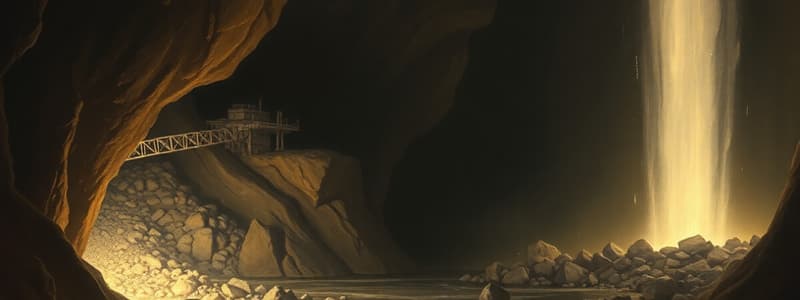Podcast
Questions and Answers
Where do geologists primarily search for secondary diamond deposits?
Where do geologists primarily search for secondary diamond deposits?
- In mountainous regions
- In urban areas
- In rivers, streams, and estuaries (correct)
- In volcanic eruptions
What mining method involves the removal of diamond-bearing ore from a surface opening?
What mining method involves the removal of diamond-bearing ore from a surface opening?
- Open-pit mining (correct)
- Cave mining
- Underground mining
- Alluvial mining
What is the most common method of underground diamond mining?
What is the most common method of underground diamond mining?
- Cave mining (correct)
- Alluvial mining
- Open-pit mining
- Surface mining
Which of the following is NOT a main step in diamond recovery?
Which of the following is NOT a main step in diamond recovery?
What has led to a shift in emphasis from secondary to primary diamond mining?
What has led to a shift in emphasis from secondary to primary diamond mining?
Where is the largest known marine diamond deposit located?
Where is the largest known marine diamond deposit located?
Which country is recognized as a top diamond producer by both value and volume?
Which country is recognized as a top diamond producer by both value and volume?
Which mine was once a significant producer of colored diamonds?
Which mine was once a significant producer of colored diamonds?
What percentage of the world's rough diamond supply is provided by Russia?
What percentage of the world's rough diamond supply is provided by Russia?
From which type of deposits are Brazil's diamonds predominantly mined?
From which type of deposits are Brazil's diamonds predominantly mined?
What is an alluvial deposit?
What is an alluvial deposit?
Which method would be primarily used to separate diamonds from lighter materials using grease?
Which method would be primarily used to separate diamonds from lighter materials using grease?
What does geochemical testing analyze?
What does geochemical testing analyze?
Which is true regarding secondary diamond deposits?
Which is true regarding secondary diamond deposits?
What is the primary purpose of bulk sampling?
What is the primary purpose of bulk sampling?
What is an indicator mineral?
What is an indicator mineral?
What does the term 'ore grade' refer to?
What does the term 'ore grade' refer to?
What is a drift in diamond mining?
What is a drift in diamond mining?
Which of the following best describes cave mining?
Which of the following best describes cave mining?
What is microdiamond testing used for?
What is microdiamond testing used for?
Testing the size, shape, clarity, and color of the diamonds in a deposit based on 500 tons of rock is ?
Testing the size, shape, clarity, and color of the diamonds in a deposit based on 500 tons of rock is ?
A recovery process that separates diamonds from lighter materials is ?
A recovery process that separates diamonds from lighter materials is ?
A secondary diamond deposit created by rivers or streams carrying diamonds to the shoreline or ocean floor is ?
A secondary diamond deposit created by rivers or streams carrying diamonds to the shoreline or ocean floor is ?
Rock or soil that covers a diamond-bearing orebody is ?
Rock or soil that covers a diamond-bearing orebody is ?
A quantity of stones, sometimes of similar size and quality, packaged together for sale or storage is ?
A quantity of stones, sometimes of similar size and quality, packaged together for sale or storage is ?
A deposit where gems are found in the rock that carried them to the surface is ?
A deposit where gems are found in the rock that carried them to the surface is ?
A process used to separate diamonds from host rock or sediments is ?
A process used to separate diamonds from host rock or sediments is ?
A vertical tunnel drilled in stable rock near the pipe to provide access for personnel, equipment, supplies, and ventilation is ?
A vertical tunnel drilled in stable rock near the pipe to provide access for personnel, equipment, supplies, and ventilation is ?
A deposit where gems are found away from their primary source is ?
A deposit where gems are found away from their primary source is ?
A process used to reduce diamond-bearing ore to smaller, more manageable sizes is ?
A process used to reduce diamond-bearing ore to smaller, more manageable sizes is ?
A recovery method that uses X-rays to detect diamonds and an air jet to remove them from the ore is ?
A recovery method that uses X-rays to detect diamonds and an air jet to remove them from the ore is ?
Most diamonds mined today come from .......
Most diamonds mined today come from .......
Diamonds are more concentrated in what type of deposit?
Diamonds are more concentrated in what type of deposit?
Geologists focus the search for primary diamond deposits on ......
Geologists focus the search for primary diamond deposits on ......
What helps geologists further narrow the search areas for diamonds ?
What helps geologists further narrow the search areas for diamonds ?
Secondary deposits require more bulk sampling than ______ to assess potential diamond content.
Secondary deposits require more bulk sampling than ______ to assess potential diamond content.
What country is the third-largest diamond producer in terms of both value and volume?
What country is the third-largest diamond producer in terms of both value and volume?
What country is home to the world’s most diverse diamond sources?
What country is home to the world’s most diverse diamond sources?
Today the majority of diamonds are produced in ....
Today the majority of diamonds are produced in ....
Sizing is accomplished through a series of .......
Sizing is accomplished through a series of .......
What kind of rock creates a primary diamond deposit?
What kind of rock creates a primary diamond deposit?
How does ore removal start in a primary deposit?
How does ore removal start in a primary deposit?
Flashcards
Primary Deposit
Primary Deposit
A deposit where gems are found in the rock that carried them to the surface.
Secondary Deposit
Secondary Deposit
A deposit where gems are found away from their primary source.
Ore Grade
Ore Grade
The concentration of diamonds in a deposit, measured by the amount of diamonds in 100 tons of earth removed.
Alluvial Deposit
Alluvial Deposit
Signup and view all the flashcards
Indicator Minerals
Indicator Minerals
Signup and view all the flashcards
Bulk Sampling
Bulk Sampling
Signup and view all the flashcards
Recovery (Diamonds)
Recovery (Diamonds)
Signup and view all the flashcards
Cratons
Cratons
Signup and view all the flashcards
Character Sampling
Character Sampling
Signup and view all the flashcards
Secondary deposits vs Primary deposits
Secondary deposits vs Primary deposits
Signup and view all the flashcards
Secondary diamond deposits
Secondary diamond deposits
Signup and view all the flashcards
Open-pit mining
Open-pit mining
Signup and view all the flashcards
Cave mining
Cave mining
Signup and view all the flashcards
Diamond recovery steps
Diamond recovery steps
Signup and view all the flashcards
Sizing (diamonds)
Sizing (diamonds)
Signup and view all the flashcards
Primary diamond mining
Primary diamond mining
Signup and view all the flashcards
Namibia
Namibia
Signup and view all the flashcards
Major diamond producing regions
Major diamond producing regions
Signup and view all the flashcards
Botswana diamond Production
Botswana diamond Production
Signup and view all the flashcards
Study Notes
Key Terms
- Alluvial Deposit: A deposit where gems are eroded from their source rock and concentrated in rivers/streams.
- Bulk Sampling: Large-scale rock sampling (5,000-10,000 tons).
- Cave Mining: Underground mining method where ore is drilled, loosened, and collected.
- Character Sampling: Testing the size, shape, clarity, and color of diamonds in a 500-ton rock sample.
- Dense Media Separation: A diamond recovery process separating diamonds from lighter materials.
- Drift: A horizontal tunnel drilled through a diamond pipe.
- Geochemical Testing: Analysis to determine the chemical composition of a sample.
- Grease Belt: A mechanism using diamonds' affinity for grease to separate them from other minerals.
- Indicator Minerals: Minerals forming with diamonds at depth, brought to the surface with them.
- Marine Deposit: Secondary diamond deposit formed by rivers/streams carrying diamonds to shorelines/ocean floors.
- Microdiamond Testing: Screening for tiny diamonds.
- Ore Grade: Diamond concentration in a deposit (amount per 100 tons of rock).
- Overburden: Rock/soil covering a diamond-bearing orebody.
- Parcel: A group of similar-size/quality diamonds for sale/storage.
- Primary Deposit: Deposit where gems are found in the rock that carried them to the surface.
- Recovery: Process separating diamonds from host rock or sediments.
- Secondary Deposit: Deposit where gems are found away from their primary source.
- Shaft: Vertical tunnel for personnel, equipment, supplies, and ventilation.
- Sizing: Reducing diamond-bearing ore to smaller sizes for easier handling.
- X-Ray Separation: Diamond recovery using X-rays to detect and separate diamonds from ore.
Key Concepts
- Most mined diamonds today come from primary deposits.
- Secondary deposits have a higher percentage of gem-quality diamonds compared to primary deposits.
- Geologists focus on cratons for primary deposits and river/stream/estuary areas for secondary deposits.
- Surveys help narrow diamond search areas.
- Secondary deposits require more extensive sampling for assessment.
- Open-pit mining removes diamond-bearing ore from the surface.
- Cave mining is a common underground diamond mining method.
- Sizing, concentrating, and recovering are the three main steps for diamond recovery.
- Sizing involves crushing and scrubbing.
- Most diamond production occurs in four main regions.
- Namibia has the world's largest known marine diamond deposit.
- Africa has diverse diamond sources.
- Botswana is a top diamond producer by value/volume.
- Australia's Argyle mine produced colored diamonds.
- Canada is a significant third-largest diamond producer.
- Russia provides roughly a third of the world's rough diamonds.
- Brazil primarily mines diamonds from alluvial deposits.
Studying That Suits You
Use AI to generate personalized quizzes and flashcards to suit your learning preferences.
Related Documents
Description
Test your knowledge on key terms related to diamond mining and recovery. This quiz covers important concepts such as alluvial deposits, bulk sampling, and geochemical testing, essential for understanding the diamond industry. Perfect for students and professionals alike!




